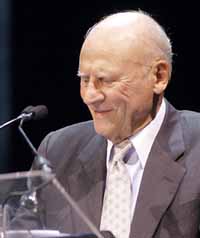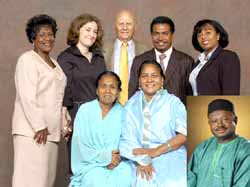A Letter to George W. Bush
By Richard N. Goldman
June 4, 2004

 |
| Richard Goldman reads his wry and impassioned "Letter to George W. Bush." |
2004 ENVIRONMENTAL PRIZE CEREMONY SPEECH
A Letter to George W. Bush
by Richard N. Goldman
Good Evening. Tonight I would like to share with you a letter I recently sent to President Bush.
Dear President Bush,
For the last one hundred years the United States of America has had a tradition of strong political leadership and bipartisan cooperation on issues pertaining to environmental protection and natural resource conservation.
The political roots of the American conservation movement are easily traced to President Theodore Roosevelt, who is today remembered as a great president in large part because he was an ardent conservationist. Theodore Roosevelt established five national parks, 51 wildlife refuges, 150 national forests and 18 National Monuments including Muir Woods and the Grand Canyon. His cousin, President Franklin Roosevelt, employed the Civilian Conservation Corps to greatly enhance the national park system.
Other presidents have upheld this legacy of environmental stewardship. President Johnson signed the Wilderness Act of 1964. President Nixon established our modern environmental regulatory structure, creating the Environmental Protection Agency and signing the Clean Air, Clean Water and Endangered Species Acts. President Carter created historic protections for federal lands in Alaska. President Reagan designated over ten million acres of land as wilderness.
Your father certainly understands the great importance of safeguarding the environment. He signed the landmark Clean Air Act Amendments of 1990, legislation which reduced toxic emissions and was applauded by industry, government and environmental groups. He adopted a policy of no net loss of wetlands and added 20 new national parks plus 57 new national wildlife refuges.
On the international front, he banned trade in elephant ivory into the United States, an action which led directly to saving African elephants from poachers. In addition, your father signed the international protocol protecting the vast continent of Antarctica, which I was pleased to discuss with him during a visit in 1991.
Given this presidential legacy and the tremendous responsibility you currently bear, it is critical not to undermine decades of environmental progress including much of your fathers good work. I urge you to support policies that mainstream analysts agree make both good environmental and good economic sense.
Someday you may be blessed with grandchildren, Mr. President. What kind of a world might these grandchildren inherit? I believe that you will want to look at your grandchildren and be able to say that your administration did all that it could to address the problems of climate change and dependence on foreign oil.
Is it justifiable that your administration opened an area larger than Texas and Oklahoma combined to logging, mining and oil extraction? Will you be able to tell your grandchildren that you did all that you could to meet the complex challenges of the 21st century, and did not sanction policies that will reduce the quality of life for future generations?
I urge you to talk with your father about the central importance of environmental conservation to Americas future. It is a theme, I was saddened to note, that was not mentioned once during your entire State of the Union address this past January. Meanwhile, the Pentagon recently declared climate change a national security threat of the greatest urgency, which should be of concern to you.
Mr. President, the citizens of this great country and indeed, people throughout the world, are deeply concerned about climate change and the absence of Americas leadership to address this threat that looms over us all. Additionally, Americans do not want arsenic in their drinking water or snowmobiles roaming through Yellowstone National Park. Likewise, we will continue to fight reckless mountaintop removal in Appalachia and we will work together to protect the habitat of our most endangered species.
President Bush, it is essential that you lead the American public and the world in these critical environmental matters. I urge you to look at the big picture to find balance in your decisions that impact the future of life on earth as we know it.
© 1999 Goldman Prize. All Rights Reserved
The Goldman Foundation One Lombard Street, Suite 303 San Francisco, CA 94111 USA Phone: 415-788-9090 Fax: 415-788-7890 Email: info@goldmanprize.org
 |
| (Standing) Margie Richard, Manana Kochladze, Richard Goldman, Demetrio do Amaral de Carvalho, Libia R. Grueso. (Seated) Champa Devi Shukla and Rashida Bee. (Insert) Rudolf N. Amenga-Etego. |
The 15th Annual
Goldman Environmental Prize
Honors the Work of Seven Inspiring Individuals
The Goldman Environmental Prize, considered the "Nobel Prize for the Environment," is given annually to grassroots environmental heroes from six geographic areas: Africa, Asia, Europe, Islands and Island Nations, North America, and South and Central America. (Two winners will share the Asia award this year.)
The Goldman Environmental Prizewinners are selected by an international jury from confidential nominations submitted by a worldwide network of environmental organizations and individuals. The Prize includes a no-strings-attached award of $125,000, the largest of its kind. The Goldman Environmental Prize, which is celebrating its 15th anniversary this year, recently conducted a survey of past recipients. The results revealed that the combined work of Goldman Award winners has positively affected an estimated 102 million people worldwide.
The Goldman Environmental Prize allows individuals to continue winning environmental victories against the odds and inspire ordinary people to take extraordinary actions to protect the world. The Goldman Environmental Prize was created in 1990 by civic leaders and philanthropists Richard N. Goldman and his late wife, Rhoda H. Goldman. Richard Goldman founded Goldman Insurance Services in San Francisco. Rhoda Goldman was a descendant of Levi Strauss, founder of the worldwide clothing company.
After 15 years, the Goldman Environmental Prize continues to honor inspiring grassroots heroes who are often opposing special interests, said Richard N. Goldman. More than 100 prize recipients from 61 countries have made the Prize representative of the growing environmental movement. We appreciate the sacrifices they make for all of us in order to gain understanding of the myriad of environmental issues facing us today.
Seven extraordinary individuals were honored as recipients of the 15th annual Goldman Environmental Prize presented in San Francisco on April 19, 2004 and in Washington, DC, on April 21, 2004.
The 2004 Goldman Environmental Prizewinners Are:
North America
Margie Richard: Louisiana
This years North American winner, grew up just 25 feet from the fence line of a Shell Chemical plant the size of nine football fields that releases more than 2 million pounds of toxic chemicals into the air each year. Four generations of Richards family have lived in the Old Diamond neighborhood of Norco, Louisiana, located within the area known as Cancer Alley. High rates of cancer, birth defects and other serious health ailments plague the towns 1,500 predominantly African-American residents.
For more than 13 years, this former middle-school teacher led a community campaign demanding fair and just resettlement costs from Shell for her family and neighbors too impoverished to relocate to a safe area. In 2002, thanks largely to Richards efforts, Shell agreed to cover relocation costs for Old Diamonds residents -- the first community relocation victory of its kind in the Deep South. The multinational giant also agreed to reduce their emissions at the Norco plant by 30 percent
Africa
Rudolf N. Amenga-Etego: Accra, Ghana
Visionary public interest lawyer Rudolf Amenga-Etego of Ghana has gained international recognition for suspending a major water privatization project backed by the World Bank. The devastating plan would further impede access to clean drinking water, a crisis linked to high rates of disease in low-income communities. The privatization would also have placed an especially harsh burden on Ghanaian girls, whose schoolwork suffers because they must spend hours each day hauling water home for their families in buckets carried on their shoulders.
South and Central America
Libia R. Grueso Castelblanco, Buenaventura, Colombia
In a major victory for the Afro-Colombian civil rights movement, social worker and activist Libia Grueso secured more than 5.9 million acres in territorial rights for the countrys black rural communities, including those in Colombias lush Pacific rainforest. Years of armed conflict, rapacious development and the narcotics industry have displaced Afro-Colombians and created an ecological catastrophe. Despite life-threatening circumstances, Gruesos brave work passing Law 70, historic legislation that officially grants Afro-Colombians territorial rights on lands they have populated for hundreds of years, gives hope to this environmental justice struggle.
Europe
Manana Kochladze: Tbilisi, Georgia
British Petroleum is leading an international consortium (which includes California-based Unocal) that hopes to construct the $3 billion Bakun-Tibilsi-Chayan project. The BTC, the largest oil pipeline in the world, would cross through Georgia, a country that has been mired in poverty and political instability since gaining its independence from Russia in 1991. For the US, the pipeline is a way to tap oil reserves in former Soviet states while bypassing Iran and Russia. But the route would run through a national park and pristine mountain gorge, home to Georgia's commercially prized mineral water (one of the few successful enterprises in Georgia's economy). Kochladze's fearless tenacity in the face of widespread government corruption and multinational interests has won critical concessions to protect local villagers and the environment and has forced a thorough examination of the projects environmental and health impacts.
Islands and Island Nations
Demetrio do Amaral de Carvalho: Dili, East Timor
Demetrio do Amaral de Carvalho is a founding father and environmental hero of East Timor, the worlds newest nation. A former resistance leader during the Indonesian occupation, de Carvalho is largely credited for spearheading the progressive inclusion of environmental justice tenets in East Timors new constitution. These principles will play a critical symbolic and legal role in guiding sustainable management of the islands rainforests, coral reefs and vast oil and gas reserves.
Asia
Rashida Bee and Champa Devi Shukla: Bhopal, India
Despite their poverty and poor health due to toxic gas exposure, Bee and Shukla have emerged as leaders in the international fight to hold Dow Chemical accountable for the infamous 1984 Union Carbide gas leak in Bhopal, India that killed 20,000 and left more than 150,000 seriously injured. (Union Carbide became a wholly owned subsidiary of Dow in 1999.) They organized the first global hunger strike to draw international attention to Dows deadly legacy and have traveled the world to protest at Dow shareholder meetings. Now on the 20th anniversary of the disaster, Bee and Shukla are plaintiffs in a class action suit demanding a clean up of the noxious factory site and damages to cover health monitoring and medical costs incurred from years of soil and water contamination.
For more information contact:







